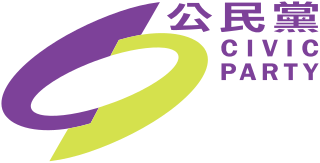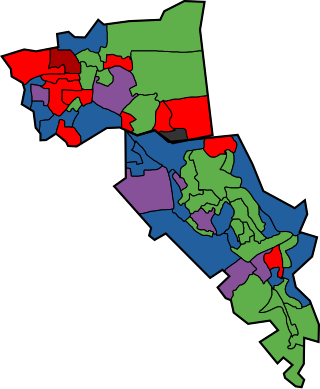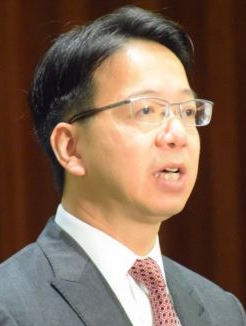
Kowloon East is the eastern part of Kowloon, covering the Wong Tai Sin and Kwun Tong District, with Kowloon City District occasionally included.

The Democratic Alliance for the Betterment and Progress of Hong Kong (DAB) is a pro-Beijing political party registered since 1992 in Hong Kong. Chaired by Gary Chan and holding 13 Legislative Council seats, it is currently the largest party in the legislature and in terms of membership, far ahead of other parties. It has been a key supporting force to the SAR administration and the central government's policies on Hong Kong.

The Democratic Party (DP) is a liberal political party in Hong Kong. Chaired by Lo Kin-hei, it is the flagship party in the pro-democracy camp and currently has no elected representatives in the District Councils.

The Hong Kong Federation of Trade Unions (HKFTU) is a pro-Beijing labour and political group established in 1948 in Hong Kong. It is the oldest and largest labour group in Hong Kong with over 420,000 members in 253 affiliates and associated trade unions. Presided by Ng Chau-pei and chaired by Kingsley Wong, it currently holds four seats in the Legislative Council and 43 seats in the District Councils.

The Hong Kong Island geographical constituency was one of the five geographical constituencies in the elections for the Legislative Council of Hong Kong from 1998 to 2021. It was established in 1998 for the first SAR Legislative Council election and was abolished under the 2021 overhaul of the Hong Kong electoral system. In the 2016 Legislative Council election, it elected six members of the Legislative Council using the Hare quota of party-list proportional representation. The constituency covered all the four districts on the Hong Kong Island, namely, Central and Western, Eastern, Southern and Wan Chai. In 2020, it had 707,277 registered voters.

The Kowloon West geographical constituency was one of the five geographical constituencies of the Legislative Council of Hong Kong from 1998 to 2021. It was established in 1998 for the first SAR Legislative Council election and was abolished under the 2021 overhaul of the Hong Kong electoral system. In the 2016 Legislative Council election, it elected six members of the Legislative Council using the Hare quota of party-list proportional representation. It had 602,733 registered electorates in 2020. The constituency corresponded to the districts of Yau Tsim Mong, Sham Shui Po, and Kowloon City.

The New Territories East geographical constituency was one of the five geographical constituencies in the Legislative Council of Hong Kong. It was established in 1998 for the first SAR Legislative Council election and was abolished under the 2021 overhaul of the Hong Kong electoral system. It encompassed Sha Tin District, Tai Po District, North District and Sai Kung District. In the 2016 Legislative Council election, nine members of the Legislative Council using the Hare quota of party-list proportional representation with 1,139,616 electorates in 2020.

The New Territories West geographical constituency was one of the geographical constituencies in the Legislative Council of Hong Kong from 1998 to 2021. It was established in 1998 for the first SAR Legislative Council election and was abolished under the 2021 overhaul of the Hong Kong electoral system. Located in the western part of the New Territories, it was the largest geographical constituency in Hong Kong with 1,308,081 electorates in 2020. It consisted of Tsuen Wan District, Kwai Tsing District, Tuen Mun District, Yuen Long District and Islands District. In the 2016 Legislative Council election, it elected nine members of the Legislative Council using the Hare quota of party-list proportional representation.

Chan Kam-lam, GBS, JP is a former member of the Legislative Council of Hong Kong representing the Kowloon East constituency. He is also a core member of the Democratic Alliance for the Betterment and Progress of Hong Kong (DAB), the largest pro-Beijing party in Hong Kong.

The Civic Party (CP) was a pro-democracy liberal political party from March 2006 to May 2023 in Hong Kong.

The 2012 Hong Kong Legislative Council election was held on 9 September 2012 for the 5th Legislative Council (LegCo) since the establishment of the Hong Kong Special Administrative Region.

The 2007 Hong Kong District Council elections were held on 18 November 2007. Elections were held to all 18 districts of Hong Kong, returned 405 members from directly elected constituencies out of total 534 councils member. A total number of 886 candidates contesting in 364 seats, while 41 seats were uncontested. A total number of 1.4 million voters cast their ballots, consisting 38% of the electorate, significantly lower than the last elections in 2003.

The 1991 Hong Kong Legislative Council election was held for members of the Legislative Council of Hong Kong (LegCo). The election of the members of functional constituencies was held on 12 September 1991 and the election of geographical constituency seats was held on 15 September respectively. It was the first ever direct election of the Legislative Council in Hong Kong history. There were 18 members from directly elected geographical constituencies, 21 members from functional constituencies, 17 members appointed by the Governor, and 3 official members.
The 1988 Hong Kong Legislative Council election was an indirect election for members of the Legislative Council of Hong Kong (LegCo); was held on 22 September 1988. It was the second ever election of the Legislative Council in Hong Kong history based on the 1987 Review of Developments in Representative Government, as the Government's democratisation process according to the agreement of the Sino-British Joint Declaration. There were 12 members elected by Electoral Colleges, 14 members from functional constituencies.

The Fifth Legislative Council of Hong Kong was the fifth meeting of the legislative branch of the Hong Kong Special Administrative Region Government. The membership of the LegCo is based on the 2012 election. The term of the session is from 1 October 2012 to 30 September 2016, during the term in office of the Chief Executive Leung Chun-ying. Due to the new arrangements agreed in a contentious LegCo vote in 2010, the session consists of the new total of 70 seats in LegCo, ten more than previously, with 35 members elected in geographical constituencies through direct elections, and 35 members in functional constituencies, in which five District Council (Second) functional constituency seats each represent all 18 District councils of Hong Kong voted for by all resident voters in Hong Kong. The Democratic Alliance for the Betterment and Progress of Hong Kong remained the largest party while the pan-democrats secured the one-third crucial minority. Notable new members of the LegCo members include Gary Fan from the new established party Neo Democrats and first openly gay councillor, People Power's Ray Chan Chi-chuen.

The Third Legislative Council of Hong Kong was the meeting of the legislative branch of the Hong Kong Special Administrative Region Government. The membership of the LegCo is based on the 2004 election. The term of the session was from 1 October 2004 to 30 September 2008, during the second half of the Tung Chee-hwa's administration until his resignation in 2005 and was replaced by Donald Tsang for the rest of the term, and also the beginning of the third term of Chief Executive after Tsang won in the 2007 Election. The Democratic Alliance for the Betterment of Hong Kong (DAB) became the largest party with 10 seats. Notable newcomers to the Legislative Council included Leung Kwok-hung, Alan Leong, Ronny Tong, Albert Cheng, and Jeffrey Lam.

The 2016 Hong Kong Legislative Council election was held on 4 September 2016 for the 6th Legislative Council of Hong Kong (LegCo). A total of 70 members, 35 from geographical constituencies (GCs) and 35 from functional constituencies (FCs), were returned. The election came after the rejection of the 2016/2017 constitutional reform proposals which suggested the electoral method for the 2016 Legislative Council remains unchanged.

The 2015 Hong Kong District Council elections were held on 22 November 2015. Elections were held to all 18 District Councils with returning 431 members from directly elected constituencies after all appointed seats had been abolished.

These are the Kowloon East results of the 2008 Hong Kong legislative election. The election was held on 7 September 2008 and all 4 seats in Kowloon East where consisted of Wong Tai Sin District and Kwun Tong District were contested, after one seat was abolished. The Democratic Party's Fred Li, Democratic Alliance for the Betterment and Progress of Hong Kong's Chan Kam-lam and Civic Party's Alan Leong each secured their party's incumbent seat, and Federation of Trade Unions's Wong Kwok-kin replaced retiring Chan Yuen-han.

The 2018 Hong Kong Legislative Council by-election was held on 11 March 2018 for four of the six vacancies in the Legislative Council of Hong Kong (LegCo) - the Hong Kong Island, Kowloon West and New Territories East geographical constituencies and the Architectural, Surveying, Planning and Landscape functional constituency - resulting from the disqualification of six pro-democrat and localist camp Legislative Council members over the 2016 oath-taking controversy. The by-election for the two other seats was not held due to pending legal appeals by the two disqualified legislators.




















